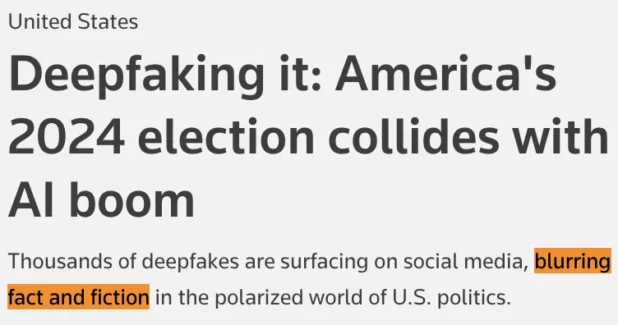Our democracy is strong.
But joking around will totally destroy it, so we have to ban people from joking around.
We all need stronger laws against horseplay, quite frankly.
“I actually like Ron DeSantis a lot,” Hillary Clinton reveals in a surprise online endorsement video. “He’s just the kind of guy this country needs, and I really mean that.”
Joe Biden finally lets the mask slip, unleashing a cruel rant at a transgender person. “You will never be a real woman,” the president snarls.
Welcome to America’s 2024 presidential race, where reality is up for grabs.
The Clinton and Biden deepfakes – realistic yet fabricated videos created by AI algorithms trained on copious online footage – are among thousands surfacing on social media, blurring fact and fiction in the polarized world of U.S. politics.
While such synthetic media has been around for several years, it’s been turbocharged over the past year by of a slew of new “generative AI” tools such as Midjourney that make it cheap and easy to create convincing deepfakes, according to Reuters interviews with about two dozen specialists in fields including AI, online misinformation and political activism.
“It’s going to be very difficult for voters to distinguish the real from the fake. And you could just imagine how either Trump supporters or Biden supporters could use this technology to make the opponent look bad,” said Darrell West, senior fellow at the Brookings Institution’s Center for Technology Innovation.
“There could be things that drop right before the election that nobody has a chance to take down.”
Tools that can generate deepfakes are being released with few or imperfect guardrails to prevent harmful misinformation as the tech sector engages in an AI arms race, said Aza Raskin, co-founder of the Center for Human Technology, a nonprofit that studies technology’s impact on society.
Former President Donald Trump, who will vie with DeSantis and others for the Republican nomination to face Biden, himself shared a doctored video of CNN anchor Anderson Cooper earlier this month on his social media platform Truth Social.
“That was President Donald J. Trump ripping us a new asshole here on CNN’s live presidential townhall,” Cooper says in the footage, although the words don’t match his lip movement.
CNN said the video was a deepfake. A representative for Trump didn’t respond to a request for comment on the clip, which was still on his son Donald Jr’s Twitter page this week.
While major social media platforms like Facebook, Twitter, and YouTube have made efforts to prohibit and remove deepfakes, their effectiveness at policing such content varies.
…
No one is certain where the generative AI road leads or how to effectively guard against its power for mass misinformation, according to the people interviewed.
Here’s the thing: if people are so stupid they can’t figure out what’s real, they should not be voting.
This is a really obvious problem. If people can’t determine the nature of a fake video from a prankster, how could they possibly cut through the bullshit of the normal mainstream media?
They couldn’t.
Democracy is stupid.
Are the American elections at risk with the rise of AI?#WorldNews | #USAhttps://t.co/dxcwO0mLxU
— The Jerusalem Post (@Jerusalem_Post) May 30, 2023

